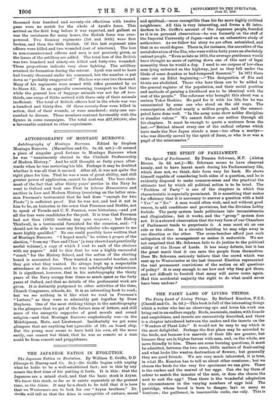AUTOBIOGRAPHY OF MONTAGU BURROWS.
Autobiography of Montagu Burrows. Edited by Stephen Montagu Burrows. (Macmillan and Co. 8s. 6d. net.)—It seemed a piece of singular good fortune to Montagu Burrows when he was "unanimously elected to the Chichele Professorship of Modern History." And he still thought so forty years after- • wards when he was reviewing his life. Perhaps it may be doubted whether it was all that it seemed. After all, it was not quite the 'right place for him. That he was a man of great ability, and still greater power of application, cannot be doubted. The bare state- ment of the fact that after thirty years' service in the Navy he went to Oxford and took one First in Literae Humaniores and another in Law and Modern History (receiving on the latter occa- sion Freeman's testimonial that he had done "enough for two Firsts") is sufficient proof. But he was not, and had it not in him to be, an historian in the sense that Freeman and Stubbs, not to speak of Fronde and C. N. Pearson, were historians,—and yet all the four were candidates for the post. It is true that Freeman had not then (1862) written any opus magnum ; but Bishop Thirlwall, in a testimonial furnished for the occasion, said : "I should not be able to name any living scholar who appears to me more highly qualified." No one could possibly have written that of Montagu Burrows. "I hoped much," he writes a propos of the election, "from my 'Pass and Class' [a very shrewd and practically useful volume], a copy of which I sent to each of the electors with my papers." Add to this that be was a highly successful 'coach" for the History School, and the action of the electing board is accounted for. They wanted a successful teacher, and they got what they wanted. He always kept up a respectable attendance at his classes, and he was indefatigably industrious. It is significant, however, that in his autobiography the thirty years of the Navy occupy four times as much space as the forty years of Oxford, and that no details of the professorial work are given. It is distinctly postponed to other activities of the time, Church Congresses, schools, &c. It is an interesting book to read; but we see nothing in it like what we read in Freeman's "Letters," as they were so admirably put together by Dean Stephens. One of the most striking things in the autobiography is the glimpses that we get of the future man of letters, and still more of the energetic supporter of good morals and sound religion—and that Montagu Burrows emphatically was—in the Midshipman, Mate, and Lieutenant. Incidentally we get some glimpses that are anything but agreeable of life on board ship. But the young man seems to have held his own, all the more easily, one cannot but think, that he was as remote as a man could be from conceit and priggishness.






















































 Previous page
Previous page